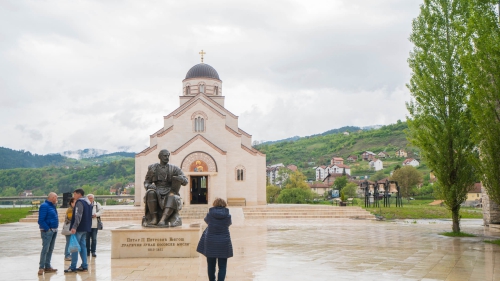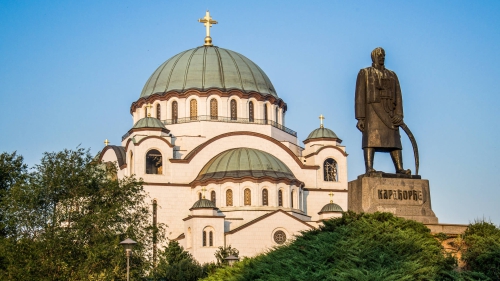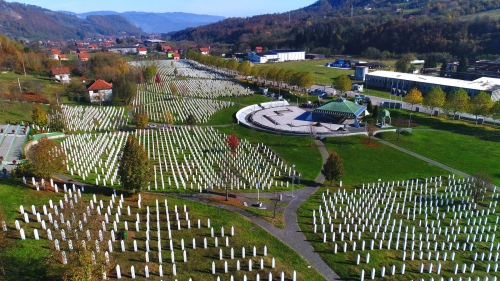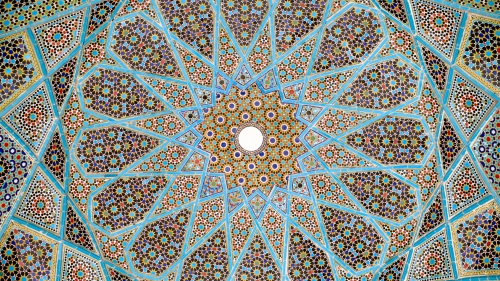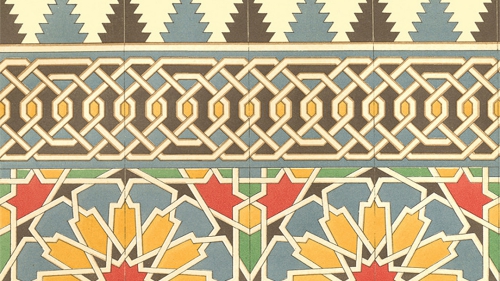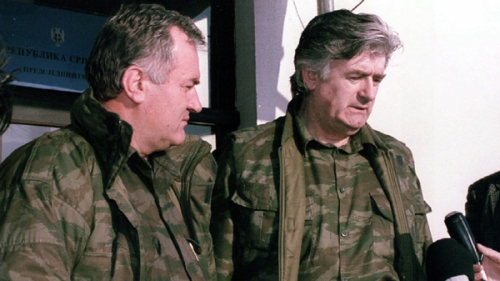Goodbye to a Muslim Hero
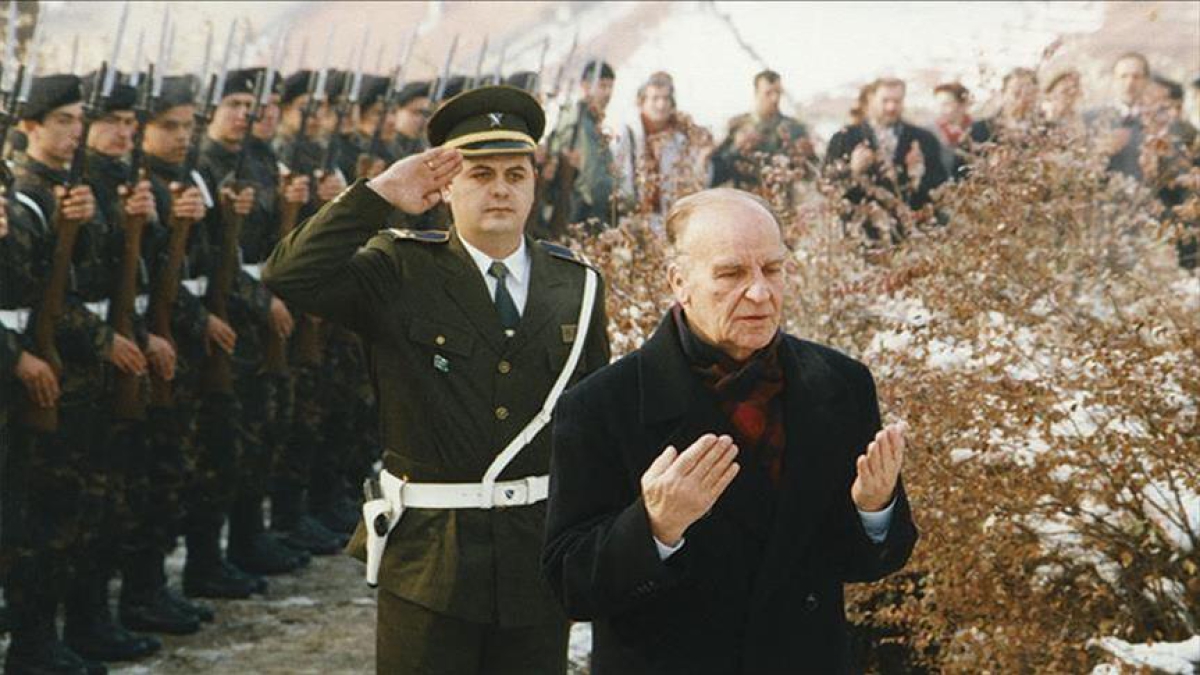
"Our goal: the Islamization of Muslims. Our methods: to believe and to struggle."-Alija Izetbegovic, "Islamic Declaration," 1970
"O' Alija, O' honored! You drive America crazy!" -Line from Arabic poetry sung by foreign mujahideen during Bosnian war
Last week, Alija Izetbegovic announced his decision to step down as president of Bosnia. The man Bosnians affectionately call "Deedo," or Grandpa, will leave office in October. In a speech announcing his resignation, Izetbegovic cited health problems as the main reason for his decision-but tellingly, he added, "The international community is pushing things forward in Bosnia...but it is doing it at expense of the Muslim people. I feel it as an injustice," he said. "These are the things that I cannot live with."
Izetbegovic's resignation is an event upon which Muslims around the world should reflect. He is one of the few Muslim political leaders of our time who demonstrates real love for Islam, and his career contains lessons in the way the West views Muslims in Europe and deals with Islamic movements in power.
"Do we want the Muslim people to leave their going-around-in-circles, their dependence, backwardness, and poverty?" Izetbegovic once wrote, "Then we show clearly which path will take us to that goal: establishing Islam in every field in the personal life of the individual, in family and society...and the establishment of a unique Islamic community from Morocco to Indonesia."
For Izetbegovic, these were not just words; they were a plan of action that he acted upon his entire life.
In 1940, at the age of 16 he co-founded the Young Muslims, a religious and political group modeled on Egypt's Ikhwan al-Muslimeen. Six years later he and his friend Nedzib Sacirbey were jailed by the communist government of Yugoslavia for helping publish the journal "Mujahid." After their release, the Communists again cracked down on the young Muslims and in 1949 sentenced four members to death and jailed many more for their Islamic activism. In 1983 Izetbegovic was arrested again for disseminating "Islamic propaganda" and sentenced to 14 years in prison and was released in 1988.
It would seem unthinkable that such a man would ever become president of a European country. But in 1990, Izetbegovic was elected president of Bosnia and Herzegovina on the eve of that country's descent into a David-and-Goliath war with Yugoslavia and Croatia. Instead of packing up his family and fleeing his country as it was overrun, as the leaders of one Persian Gulf nation recently did, he stayed to lead his people throughout the war from his sandbagged office and his modest apartment. In doing so, he became for the world the face of the Bosnian people's struggle for survival in the face of genocide.
Izetbegovic led an army that managed to beat back vastly superior Croatian and Serbian forces. But he leaves another crucial legacy: for Bosnians, he took the shame out of being a Muslim. In Yugoslavia, regular visits to the mosque meant being snubbed for jobs in the Communist Party-controlled economy. Islam was demonized in history books, and practicing Muslim students could expect vastly lower grades regardless of how much they studied. Even the Arabic and Turkish words and expressions that enrich the Bosnian language were systematically removed and derided as "uncultured."
But "Alija Izetbegovic succeeded in organizing Muslims as a nation in Bosnia," Dr. Zuhdija Adilovic, a professor at the Islamic Pedagogic Academy in Zenica, told iviews.com in an interview. "This was the first time that Muslims had come to power in Bosnia."
With that power, the president embarked on a policy of reaffirmation of Bosnians' cultural identity. Today, children study their religion in public schools. Government employees, businessmen, soldiers, and university students can openly practice Islam with a sense of dignity. A worshipper in one of Sarajevo's packed mosques today might find a street sweeper praying on his left side and the city's mayor praying on his right.
Izetbegovic's unapologetic approach to his religion and his political power made the West uneasy. Amid warnings of a "fundamentalists Islamic state" in Europe, America and the EU stood by for three years facilitating the genocide of the Bosnian Muslim people. In 1995, when Islamic brigades of the Bosnian army launched a massive assault on Serb forces and seized thirty percent of Serb-controlled territory in a few days, it dawned on the West that Muslims might actually be victorious. America and Europe suddenly demanded peace.
A "peace plan" drawn up and imposed by the United States and enforced by NATO military occupation rewarded Serbs with their own state on half of Bosnia's territory, while Croats received another twenty-five percent. The US plan left Muslims, which make up approximately half of Bosnia's population, quarantined and landlocked on one quarter of their country.
The US peace plan imposed a system of government on Bosnia that guarantees perpetual economic and political stagnation and weakens Muslim political power. Serbs, Muslims, and Croats each have an equal voice in a three-member "presidency" in Bosnia, even though Muslims make up the majority of the population. If the country were a "real" democracy, with each citizen having an equal voice, Bosnia would be virtually guaranteed Muslim leadership by virtue of demographic. And under the current system, the government only takes action by consensus. With Serbs and Croats determined to undermine Muslims at every step, consensus never occurs, and in practice, the real power in Bosnia is wielded by the European Union.
Iviews.com asked Nedzib Sacirbey, Bosnia's ambassador-at-large and Izetbegovic's friend and cellmate from his youth, what Izetbegovic meant when he said, "the international community is pushing things forward in Bosnia...at expense of the Muslim people."
"The number one obstacle is that the international community did not use its power to return refugees, which would create a multi-ethnic society," Sacirbey said. "And for example, in Banja Luka, the Serbs leveled all mosques, but now 5 years after the war, there is still no permission to build one single mosque. It is the same in Croatian part."
The European Union's failure to return Muslim refugees to their homes in occupied areas of Bosnia enforces the war's ethnic cleansing. Meanwhile, for the most part, Serbs and Croats travel to and live in Muslim areas freely. On a recent trip to Mostar, a city divided in half with Muslim and Croat areas, iviews.com spoke to residents on both sides of the fault-line. Asked whether she would feel afraid to travel to the Muslim side, a Croat woman said, "No, I go there all the time to shop and visit my daughter." On the other hand, several Croats said they did not want Muslims on their side, and many Muslims said they faced harassment and threats of violence whenever they crossed the river separating the two communities.
The United States and the EU do, however, use their power to actively undermine Izetbegovic and his Party for Democratic Action (SDA) and to promote the former Communist Party of Bosnia, which was renamed the Social Democrat Party (SDP). Fed up with a lack of economic progress, a large number of Bosnian Muslim voters shifted support to the neo-communists in the most recent elections. The fact that the US State Department provided SDP with crucial logistic support for its campaigns didn't hurt either.
At the same time, Wolfgang Petritsch, the head of the European Union's civil authority in Bosnia, urged voters to dump "the leaders from the war," of which Izetbegovic is the only one remaining. And the EU ran advertisements on the television network it operates urging viewers to vote for "change"-in other words, change the leadership of the communist opposition.
With characteristic doublespeak, the, US State Department describes the result of its efforts as a victory for "political pluralism...at the expense of the ruling national parties." Sacirbey, as would most rational observers, calls it interference in the democratic process. "We expect them to say, 'Use your voting rights, vote for the best candidate,' not, 'Vote for or against so and so'," said Sacirbey.
Muslims have plenty to worry about with regard to the SDP. At an outdoor rally in Tuzla two months ago, SDP members feasted on barbecued pork chops to demonstrate their "secularism." They have announced their intention to rename the main road in the Muslim stronghold of Zenica, after Yugoslavia's communist dictator. Additionally, a group of party activists reportedly hurled stones at a mosque recently.
So many of the problems of the Islamic world that we typically blame on others are fundamentally the fault of Muslims, but not so in Bosnia. In the face of this internationally organized quagmire designed to paralyze and under develop Muslim progress in Bosnia, Alija Izetbegovic decided he didn't have the strength to continue. "Somebody must come who can deal with such problems," he said.
The tragedy of Bosnia is not only that 350,000 men, women, and children died because their neighbors hated them for their religion, or that thousands of women were raped, or that hundreds of mosques were razed. What does it say about our civilization, that politicians in Europe and America had the power to intervene, but chose not to? It suggests not only that for the West, the lives of Muslims are not worth the trouble. The failure to stop the ethnic cleansing of Bosnian Muslims, along with the behavior of the West in post-war Bosnia, suggests that genocide will be tolerated for the sake of a political goal; in this case, the prevention of a European Muslim state. The lesson for Muslims deluded by our era's lofty talk of "democracy" is that for America and Europe, the stated goal of "promoting democracy" will be overridden by their pathological fear of Islam.
But in the face of the tragedy of genocide and betrayal by the West, Izetbegovic triumphed. He led Bosnia to freedom from Yugoslavia as an independent, sovereign state. He raised an army to defend his people. He led the renaissance of Islam in Bosnia, while protecting the rights of Christians in the areas under his control. For this, we should thank him, and wish him well.






